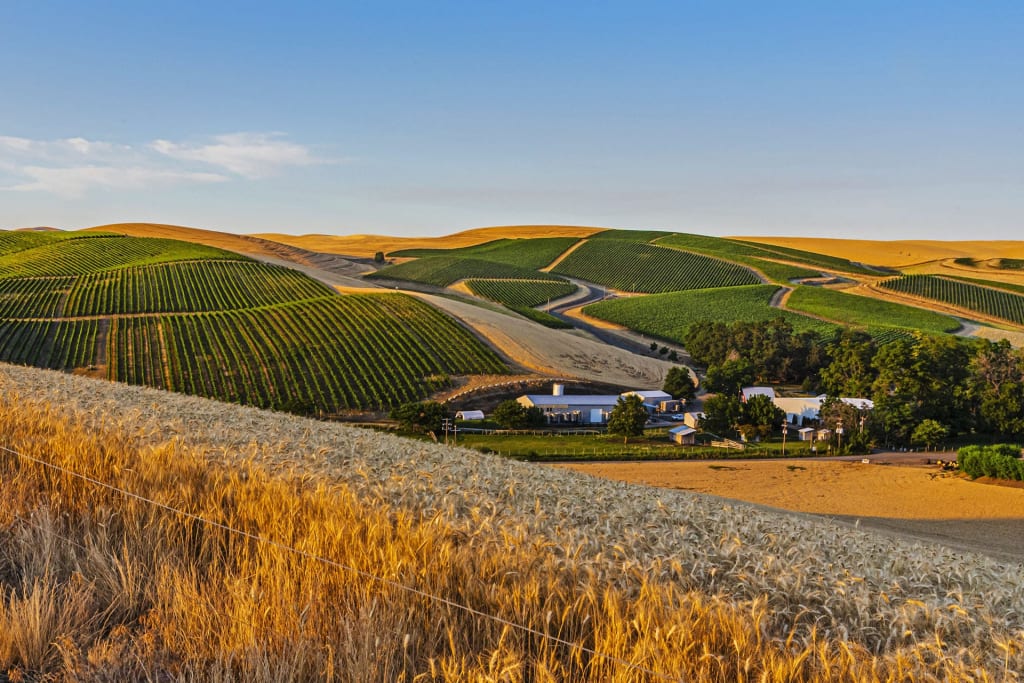 |
| Richard Duval image |
Walla Walla. To the indigenous Salantins, the name means "place of many waters." But, to wine people everywhere, Walla Walla means some of Washington state's best wine.
Located in southeastern Washington, on the border with Oregon, Walla Walla shares top-wine honors with Woodinville, in the western part of the state, near Seattle. The two regions are separated by miles of high desert, farmland and the Cascade mountain range. Eastern Washington is also known for wheat farming and the famous Walla Walla sweet onions.
Walla Walla's 120-plus wineries are mostly scattered around the city of Walla Walla and in a corner of Oregon. The Walla Walla AVA (1984) is a two-state appellation; Walla Walla in Washington, Milton-Freewater in Oregon. Walla Walla AVA itself is within the much larger Columbia Valley AVA.
Milton-Freewater was granted its own AVA in 2015 and has since gained wide attention for a particular geologic formation. The Rocks District, a sub-appellation of Milton-Freewater, is in an ancient dry riverbed covered with large smooth stones, similar to the vineyards of Chateauneuf-du-Pape in France. The Rocks has built a solid reputation for distinctive Syrah.
Walla Walla is red wine country. More than 80% of varieties planted in the AVA are Cabernet Sauvignon, Merlot and Syrah. Most of the remaining 20% is Cabernet Franc and small plantings of other red grapes. White grapes, led by Chardonnay, account for just a small percentage of the total plantings.

Like most vineyards in eastern Washington, irrigation is necessary in Walla Walla AVA vineyards. The eastern part of the appellation, though, tends to be at higher elevations, with cooler daytime temperatures, permitting dry farming, a rarity for vineyards in Washington.
The other major concentration of Washington wineries is centered around the city of Woodinville, northeast of Seattle. Woodinville hosts 130 wineries that draw grapes from throughout the vast Columbia Valley. Being near Seattle makes it easy to visit Woodinville wineries, although the distance from a big city hasn't stopped wine lovers from making the trek to Walla Walla.
Walla Walla History
Some settlers moving west along the Oregon Trail in the 19th century decided to stay in eastern Washington, finding the land around Walla Walla good for farming. In the 1850s, grape vines were added to the crops, for eating out of hand and making wine. Vineyards expanded and by the 1880s, growers were hoping to ship grapes and wine to Seattle by train. But the transcontinental railroad had bypassed Walla Walla, dealing an economic blow to the nascent wine industry. Prohibition dealt another setback, and it was nearly 40 years before the wine industry began to recover.
Today, fans of the diverse range of Walla Walla wines, owe a debt of gratitude to Gary Figgins of Leonetti Cellar, who is credited with being the first to plant vinifera vines in the area, in the early 1970s. Leonetti went on to win acclaim for Cabernet Sauvignon and Merlot. Throughout the 1970s and 1980s, Walla Walla wine got a further boost from L'Ecole 41, Woodward Canyon, Waterbrook Winery and Seven Hills Winery in Oregon, all of them iconic Walla Walla AVA wineries.
By 2008, a long list of new wineries came on line, sparking interest in different wines, such as those made from Rhone varieties, the odd Italian grape like Sangiovese, and Tempranillo, Spain's most distinguished red variety.
The Rhone Rangers, started in California, raised interest among Walla Walla winemakers, in Rhone-style wines, especially for Syrah. Prospective Rangers in the Walla Walla AVA, like Rotie, a small producer that took its name from Cote Rotie, a Northern Rhone Valley wine, embraced the Rhone wine concept.
Walla Walla Wines
Walla Walla is best known for Cabernet Sauvignon and Bordeaux-style blends, incorporating Merlot and Cabernet Franc. Besides Syrah, a handful of wineries are working with other Rhone grapes, like Viognier and Roussanne.
The following dozen Walla Walla-area wineries are listed by location:
East of the city: Figgins, Walla Walla Vintners, Leonetti Cellars.
West of the city: L'Ecole No. 41, Long Shadows Vintners, Woodward Canyon.
South of the city: Pepper Bridge Winery, Doubleback, Patterson Cellars.
Milton-Freewater: Atelier Freewater, Rotie Cellars, Watermill Winery.
On your next trip to the wine store, look for the Washington wine section and Walla Walla. It's worth the search.
Next post: Prosecco Rising
Leave a comment at boydvino707@gmail.com



No comments:
Post a Comment
Note: Only a member of this blog may post a comment.